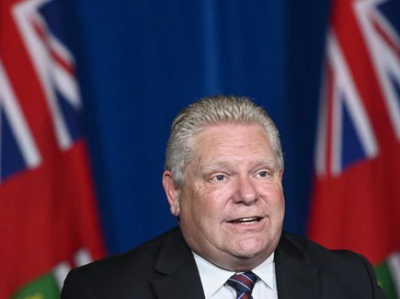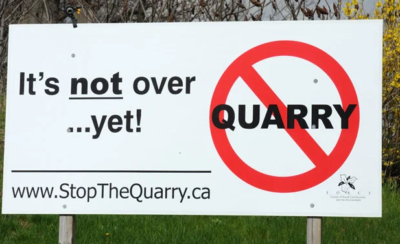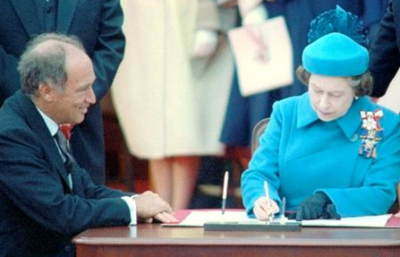 By Christine Van Geyn and Scott Hennig.
By Christine Van Geyn and Scott Hennig.
June 14th, 2021
Reprinted from the Globe and Mail.
Politicians are going to politician. It doesn’t matter their party, the colour of their election sign or ideological background. Politicians will take any opportunity to silence their critics – even if it means enacting unconstitutional laws. And that’s precisely what Ontario Premier Doug Ford is doing by invoking the Constitution’s notwithstanding clause to overrule a recent Ontario court decision that struck down his government’s gag law.
To be fair, it wasn’t originally his gag law. Kathleen Wynne’s Liberal government first brought in a law in 2016 that gagged citizens from using paid means of amplifying their voices – not just during the election, but a full 180 days before the election even started.

Ontario Premier Doug Ford
But Mr. Ford doubled down on Ms. Wynne’s law when he introduced Bill 254 to expand the restrictions to a full 365 days prior to an election. That means today, with just under a year to go before the next Ontario election, citizens are effectively barred from spending their own money to voice their opinion on any political issue.
Sure, you will still see some political ads from non-politicians over the next 12 months, but they will be limited and only run by those with the deepest pockets and with paid staff who can jump through all of the red tape.

If this sign said something about the government it wold probably be illegal.
However, if your grandmother Donna and her bridge group want to pool their money to buy some lawn signs to voice their opinion on long wait times in Ontario’s health care system, the huge amount of debt the government is running up, or why they think the official provincial bird should be changed from the common loon to the blue jay, they will want to consult a lawyer.
For starters, Donna and her bridge buddies will have to register with Elections Ontario and appoint a chief financial officer if they want to spend more than $500 over a 12-month period. With current lumber prices, the cost of stakes for a handful of signs will push over that limit.
If they trip over the next threshold of $5,000 in signs, they will have to hire a professional auditor to investigate their bookkeeping and ensure that every cent is accounted for. Donna and her friends will have to figure out how to fill out reams of government forms.
But they likely won’t – because it won’t be worth the struggle and getting it wrong can result in large fines. This silence is exactly what politicians want.
It’s even questionable whether larger groups can move that mountain of paperwork. If a group of small businesses want to voice their opinions on government lockdown rules that favour big businesses, the law actually requires they file a new report for every $1,000 in spending. Meaning, if they reached the cap of $600,000 in spending, they could have to file 600 separate reports with the government over the next 365 days. The requirements may indeed be so nonsensical and onerous that their very purpose is to deter groups from advertising.
While Mr. Ford’s target may be the union coalition Working Families, the impact of the law is far broader, and limits comment on essentially any public policy issue when these comments matter the most.

Queen Elizabeth II and Prime Minister Pierre Elliott Trudeau signed the Proclamation of the Constitution Act on April 17, 1982; it was accompanied by The Canadian Charter of Rights and Freedoms.
The Canadian Charter of Rights and Freedoms guarantees the right to free expression. What makes Canada a special place that people all around the world want to call home is that we embrace differing opinions and let our citizens have a voice. Freedom of expression is a fundamental right that should be embraced. Petty dictators wield power to silence the voices of their critics. In liberal democracies, we demand better.
Justice Edward Morgan rightfully ruled that Ontario’s gag law was too restrictive on Ontarians’ right to free expression, declaring the changes to the Election Finances Act unconstitutional. While the notwithstanding clause is available, Mr. Ford’s decision to use it here, without even taking the time to appeal the decision, is patently self-serving. It is a demonstration of incumbent arrogance, indifference towards free expression, and shows a bizarre and warped sense of priorities. And now Ontarians who want to speak out and say as much have their voices muzzled by this very law.
Christine Van Geyn is the litigation director for the Canadian Constitution Foundation. Scott Hennig is the president and CEO of the Canadian Taxpayers Federation.




















Having read Bill 307, the submittal appears to contain some misinformation. There are limits to 3rd party spending and they are set out in S37.10. (“No third party shall spend, (a) more than $24,000 in any electoral district for the purpose of third party political advertising in that district during the 12-month period immediately before the issue of a writ of election for a general election. Or (b) more than $600,000 in total for the purposes of third party political advertising during the 12-month period immediately before the issue of a writ…”)
The Bill also contains a section on circumventing the law. (“No third party shall circumvent, or attempt to circumvent, a limit set out in this section in any manner, including by, (a) acting in collusion with another third party so that their combined political advertising expenses exceed the applicable limit;. Or (b) splitting itself into two or more third parties;”)
I found no mention in Bill 307 of the $500 or $5,000 threshold limits. Nor did I find the duty to report, as described, and only applies when the aggregate spending increases by an amount of at least $1,000 and the thresholds in S37.10.1.
I think we can all can agree that the use of the Notwithstanding clause should be sparse. At the same time, we cannot allow deep pocketed unions or businesses to control our election process. We saw what can happen right her in Burlington during the last municipal election. On this matter, former Premier Wynne was on the right track.
Finally, and this may irk some people but, Rights such as Freedom of Expression are not absolute. Our Charter establishes that reasonable limits can be placed on some Rights if those limits are prescribed by law and can be demonstrably justified in a free and democratic society. There is no better place to limit the influence of deep pockets, than during our election cycle.
Did I miss something in the year of Covid? This Notwithstanding issue is a Major attempt to overture a Court Decision, and impose the will of the Current Majority Party to cancel our fundamental . rights in Canada.—.Passed Jun 6 2021 by PC..
Are we now in USA North? Or Russia?, China? etc… Did we abolish The Charter of Rights? The Freedoms and Rights for our Democracy for Freedom of Expression, Did we lose the right for all to express facts, views within the laws of libel, And the voices of “Responsible, verified reporting of facts by bi-partisan trained Reporters of a Free Press, -(many choices here in Ontario Pick your paper).
No Party should be able to gag this freedom– There are Deep pockets for all the parties.- just different pockets. Big Business, Unions, Environmentalist etc..
However, I also ask
Has our Digital world become the Norm when FB, Tweets, Friends, and Party Politics is our source of information ?–
Sorry, My choice for re-election will be based on Reliable, accountable sources. Facts, past actions…
And my hope is that Every Intelligent, informed citizen will look at this issue see it for what it is intended to do and vote accordingly to the Party of their choice– when the time comes.
What a crazy, override by Ford.
He’s guaranteeing he will be a one term Premier.
Next government will need to undo this injustice.
We can’t leave government to be ruled by the wealthy.
Right Phillip there is always two sides to every story and the public is in most cases not aware of both sides. People eith deep pockets have contolled our elections and governments for years with municipal being the worst.
I just can’t resist this – now what do you have to say Mr. Wooster?
“Arrogant indifference towards free expression”. I was on FB and an article appeared on the “Elementary Educators” site condemning Ford for infringing on freedom of expression but when I went to comment, I discovered that I was blocked from commenting. Apparently, freedom of expression to union bosses means you’re free to express your opinions as long as you agree with us. BUT WAIT IT GETS WORSE! I was talking about this hypocrisy to a close personal friend who posted a couple of messages indicating that this site was blocking critics from expressing their opinions on the matter. GUESS WHAT? He too was blocked and his comments deleted!
Phil,
Your comment is a remarkably short evasion and projection of fault that misses the point – this is the Ford government gagging the entire population during an election.
Do you not get it? Do you really support this?
Surely you can do better excuse making than this. It certainly says something about you and your credibility. It’s just more hyperbole.
A bit over the top, Tom! Ford is NOT gagging the entire population–political parties are free to campaign, news media are free to report. However, special interests are limited in how much they can spend—or are you in favour of special interests having a blank cheque to unduly influence an election. I think it says a lot when one of these special interests is screaming about their right to freedom of expression but at the same time has no reservations about limiting freedom of expression for those who don’t agree with them.
By the way, I don’t recall you objecting strenuously when the Wynne government first introduced this legislation or did I miss it?
I trust you simply missed the point that Mr Ford did not correct what you point out as merely Wynne’s fault anyway. He instead was too lazy to appeal a lower court ruling and introduced a clause to over ride any possible legal objection in advance. Thus opening the doors for every tinpot politician to do the same, and thus destroy our Constitution.
No Perry, Premier Ford is not “destroying” the Constitution. The notwithstanding clause is PART of the Constitution–it was put there at the insistence of the provinces, to protect one of our basic constitutional principles, the supremacy of Parliament. Our democracy thrives when we have free and fair elections and part of that is protecting the electoral process from allowing special interests with deep pockets to unduly influence an election. Are you aware that a report in the Globe and Mail in 2016 revealed that unions were behind 94% of the $16.4 million spent on third-party campaign ads during the 2007, 2011 and 2014 election campaigns? Would you really be in favour of allowing this undue influence if private corporations were behind the bulk of such advertising–or do you just want unions to have this ability?